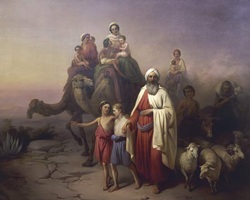 The March of Abraham, by József Molnár Genesis 12:1-4 (ESV) “Now the LORD said to Abram, 'Go from your country and your kindred and your father's house to the land that I will show you. And I will make of you a great nation, and I will bless you and make your name great, so that you will be a blessing. I will bless those who bless you, and him who dishonors you I will curse, and in you all the families of the earth shall be blessed.' So Abram went, as the LORD had told him, and Lot went with him. Abram was seventy-five years old when he departed from Haran.” Outline. The Tower of Babel and the subsequent diaspora is told in the Genesis 11 along with a ten generation genealogy from Shem to Abram. The previous chapter culminates in the telling of Abram's father (Terah) setting out for Canaan with his family (from Ur), but they settle in Haran. From there chapter 12 begins with Abram's call and blessing that will bless all peoples. Abram obeyed God's call taking his family and Lot with him to Canaan where God once again confirmed His blessing and where Abram built an altar to God. However, a famine forced Abram south to Egypt where he lied about Sarai being his sister (not his wife), which God had to deliver them from. Historical Context. Abram receives his call from God to go during the patriarchal period, which makes exact dating impossible (but can be set well before 1500BC). The Table of Nations in Genesis 10 depicts human migration as far as the Aegean Sea in the north to Ethiopia in the south and from Persia in the east to Egypt in the west in what is commonly known as the fertile crescent (Elwell, 19)1. According to Acts 7:2 “this call must have come to him while he still lived in Ur” (likely a city in eastern Mesopotamia) before being renewed years later in the city of Haran (on northern Eurphrates River) when Abram set out for the promised land of Canaan (Pfeiffer, 17)2 . Message Summary. God's promised plan of salvation/redemption (the “seed” of the woman) for all the peoples of the earth was established to come through the line of Seth and now explicitly through Abraham's lineage. Dominant Theme. Since the Promise of God theme emphasizes the indispensable role of God's spoken word and faithfulness in fulfilling those words, Genesis 12:1-3 is a key supporting verse since God gave His Word to Abram that He would remain faithful to humankind. God spoke a threefold promise to Abram of being a nation, personal blessing, and a great name in order to provide God's promise universally (determined by the Hebrew verb shifts to perfect tense to signal a purpose clause (Kaiser, 55)3). In addition, God uses the word “blessing,” which represents God's promise in the Pentateuch (Kaiser, 35), five times in these three verses. OT & NT Correlation. While very few Old Testament passages preceded God's promise to make Abram a nation so that he might bless all peoples, this call reveals God's reversal of the curse at the Tower of Babel which scattered all the peoples and subsequently a response to the newly founded table of nations (Gen. 10) that were repopulating the Earth through Noah's sons Shem, Japheth, and Ham. This passage also continues the hope of the promised savior in the “seed” of the woman as Abraham carries on the lineage of Eve through Shem to bless all peoples. The New Testament very clearly depicts Jesus Christ as the culmination of the promise of the woman's seed through the line of Shem. After healing a beggar by the temple (Acts 3:23), the apostle Peter proclaimed the crucified and resurrected Christ as the fulfillment of prophecy (Deut. 18:15) based on this promise. Likewise, the apostle Paul quotes this promise to the church in Galatia (Galatians 3:8) to remind them that it is not through the law, but through faith in Christ, who offered Himself as a propitiatory sacrifice on the cross for all who accept His substitute, that God would bless all peoples. In the Great Commission passages, Christ Himself, charged His apostles with carrying the good news of the fulfillment of His promise to all the peoples of the earth.
0 Comments
Leave a Reply. |
AuthorBrett Yardley: Categories
All
Archives
January 2019
|

